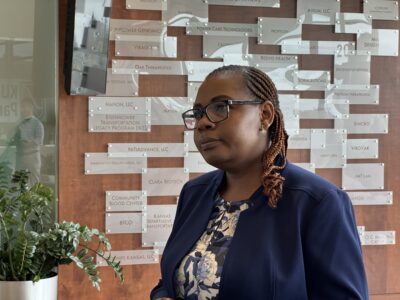KU implements automatic enrollment policy for math requirements
Brian Orloff and his son, who entered Kansas University this semester, hoped to put off those pesky math requirements for a semester, but a new KU policy won’t allow that anymore.
Orloff’s son, who enrolled at KU this spring, had previously taken classes at Johnson County Community College. But he hadn’t completed any math classes.
They then found that KU is pretty serious about getting students in the College of Liberal Arts and Sciences to enroll in basic math courses early and continuously.
So serious that, as of last semester, if those students haven’t demonstrated the ability to fulfill basic math requirements upon entering KU and don’t sign up to take those classes in their first semester, the university will automatically enroll them in a math class until they complete an algebra or pre-calculus class.
Not fulfilling the math requirement is one of the top barriers to graduation, said Kim McNeley, a KU assistant liberal arts and sciences dean. And the longer students delay taking it out of high school, the more difficult it becomes, she said.
The school sends students who need to take the classes three notices: one through the mail, and two through e-mails directing to the students’ online KYou Portal. Advisers also discuss the issue with them, McNeley said.
KU also tracks whether the students have read the notices in the portal.
If students aren’t enrolled in math classes by the last day before classes begin, KU will automatically add a math class to the students’ schedule.
For KU, it became a question of how much responsibility students should have to do the things that set themselves up for graduation weighed against the responsibility the university has to set students up for success, she said.
If they choose, students may opt to take the classes at other schools or community colleges, McNeley said, as long as they enroll in their first semester.
“These are pretty basic math courses, and community colleges do a great job with that,” she said.
KU has a petition process by which some students can postpone the enrollment in situations if they have conflicting enrollments with other classes, excessive responsibilities outside of school along with some other situations.
“What we typically don’t approve is ‘I just don’t want to do it now,'” McNeley said.
By the time students are allowed to drop the class, they have to take a “W” on their transcripts and have to pay the tuition for the course.
That frustrated Orloff, who lives in Orlando, Fla. He compared the policy to something like ordering a soup and a salad at a restaurant and getting a soup and pasta instead, and being forced to pay for it.
McNeley said when they first started enforcing the policy, they noticed students were enrolling in the classes and then immediately dropping them. The school provided a way out of the class later in the semester to avoid forcing a student into a failing grade.
Orloff said while he understood why the university wanted to increase its graduation rates, he still felt like students should be able to decide when they want to fulfill certain graduation requirements.
“It shouldn’t be up to the university to put a policy in place to force me as a parent to spend money on a class that my child doesn’t want to take anyway,” he said.







